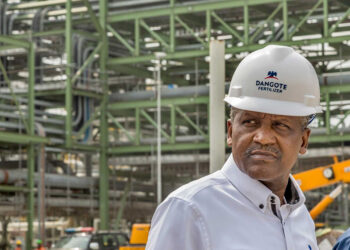The Lagos Chamber of Commerce and Industry (LCCI) has predicted that Nigeria’s total debt stock is expected to hit N45.9 trillion by December 2022.
The President, LCCI, Mr. Michael Olawale –Cole, disclosed this in the quarterly press briefing on the state of the nation, where he spoke about the country’s debt stock expected to increase as a result of the federal government’s plan to borrow an additional N1.6trillion, while the 2022 debt target for domestic borrowing was pegged at N2.57trillion.
He explained the country’s plan to borrow the N2.57 trillion from foreign credit while the N1.6 trillion is expected to be borrowed from multilateral/bilateral drawdowns.
Overall, he said that the federal government plans to borrow a sum of N6.3 trillion in addition to the 39.6 trillion Total Debt Stock of the country, which would push the country’s total debt to N45.9 trillion by December 2022.
The LLCI boss went further to mention that the 2022 federal government budget has been revised to have a deficit of N7.35 trillion from the approved N6.26 trillion, I the recent request of an additional N965.4 billion presented at the House of Assembly by the Presidency is approved. Hence, the country’s debt service to revenue ratio is expected to increase significantly if revenue levels do not increase in a similar proportion.
He also included that tougher times lie ahead for the manufacturing sector of the economy this second quarter of the year, predicting that the manufacturing sector would likely suffer due to poor public infrastructure, and port-related challenges as these may continue to persist as headwinds to the sector’s performance.
Additionally, He warned that Nigerians should expect headline inflation to remain elevated with the Russia-Ukraine conflict ongoing, as supply chains of raw materials have been disrupted, higher energy costs, FX scarcity, and heightened insecurity in major food-producing states would continue to mount pressure on the consumer prices.
He talked about the power sector, making emphasis on the frequent collapse of the national grid. He stated, “It is becoming clearer that the national grid cannot supply sufficient power to meet the nation’s electricity demand”. Hence, businesses have had to deal with the rising cost of manufacturing, exorbitant logistics fares, and constrained production.
He added that the cost of diesel is also rising as it now records a price range between N750 and N800 per litre making it super expensive for businesses to generate their electricity for production and other daily activities.
However, Dr. Olawale warned about the fact that the situation could lead to job losses as output is constrained and some manufacturers now fear shutting down due to the unbearable cost of production.
He then called on the Central Bank of Nigeria and policymakers to integrate the fiscal and monetary policies toward addressing the identified structural constraints that will significantly help moderate inflationary pressure in the short term. He added that the CBN’s role in ensuring Credit to the private sector should increase and targeted to support growth sectors and export-promoting sectors.
The LCCI boss added, “The government should create funding for critical infrastructure and special purpose intervention in the power sector.” He mentioned about the newly launched infrastructure Corporation of Nigeria (InfraCorp) has a mandate to focus on power, renewables, transport, and logistics, stating that the InfraCorp will succeed in mobilizing private sector participation if they can help achieve cost-reflective pricing in the power sector.
He suggested that a transition to renewable energy will be a more sustainable solution to Nigeria’s power shortages. However, he included that, the gas-to-power infrastructure requires an overhaul to resolve the persisting gas shortage.











